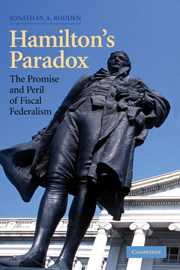Book contents
- Frontmatter
- Contents
- Preface
- Acknowledgments
- 1 INTRODUCTION AND OVERVIEW
- 2 PROMISE AND PERIL: INTELLECTUAL HISTORY
- 3 SOVEREIGNTY AND COMMITMENT
- 4 THE POWER OF THE PURSE: INTERGOVERNMENTAL GRANTS AND FISCAL DISCIPLINE
- 5 DISEASE OR CURE? POLITICAL PARTIES AND FISCAL DISCIPLINE
- 6 AN APPROACH TO COMPARATIVE CASE STUDIES
- 7 FISCAL FEDERALISM AND BAILOUTS IN POSTWAR GERMANY
- 8 THE CRISIS OF FISCAL FEDERALISM IN BRAZIL
- 9 THE CHALLENGE OF REFORM IN FEDERATIONS
- 10 THE ORIGINS OF SUBNATIONAL SOVEREIGNTY
- 11 CONCLUSIONS
- References
- Index
- Titles in the series
Preface
Published online by Cambridge University Press: 14 January 2010
- Frontmatter
- Contents
- Preface
- Acknowledgments
- 1 INTRODUCTION AND OVERVIEW
- 2 PROMISE AND PERIL: INTELLECTUAL HISTORY
- 3 SOVEREIGNTY AND COMMITMENT
- 4 THE POWER OF THE PURSE: INTERGOVERNMENTAL GRANTS AND FISCAL DISCIPLINE
- 5 DISEASE OR CURE? POLITICAL PARTIES AND FISCAL DISCIPLINE
- 6 AN APPROACH TO COMPARATIVE CASE STUDIES
- 7 FISCAL FEDERALISM AND BAILOUTS IN POSTWAR GERMANY
- 8 THE CRISIS OF FISCAL FEDERALISM IN BRAZIL
- 9 THE CHALLENGE OF REFORM IN FEDERATIONS
- 10 THE ORIGINS OF SUBNATIONAL SOVEREIGNTY
- 11 CONCLUSIONS
- References
- Index
- Titles in the series
Summary
This project started in the late 1990s with the simple observation that however compelling and elegant, leading theories of federalism in economics and political science had little to do with most of what was interesting about developments in federations around the world. Optimistic theories promised that decentralization would yield improved efficiency and governance in a wide variety of countries. Yet disastrous debt accumulation among state and provincial governments in Argentina and Brazil had direct negative implications for macroeconomic and political stability, and the literature seemed to provide no hint of an explanation. Moreover, similar problems have existed on a smaller scale for some time in several countries and are sprouting up along with transitions to democracy and fiscal decentralization in others. Next, I learned that episodes of unsustainable borrowing by states and provinces, followed by rancorous debates about federal bailouts, are as old as federalism itself. I set out to rethink theories of federalism and fiscal decentralization, develop some testable arguments about the causes of fiscal indiscipline in multitiered systems of government, and confront them with data from around the world.
Much of the book was written before I realized that Alexander Hamilton had already done something like this. Upon rereading The Federalist and then moving on to explore his other writings, I gained an appreciation not only of Hamilton's imprint on the United States, but also his imprint on theories and analyses of federalism.
- Type
- Chapter
- Information
- Hamilton's ParadoxThe Promise and Peril of Fiscal Federalism, pp. xi - xivPublisher: Cambridge University PressPrint publication year: 2005

